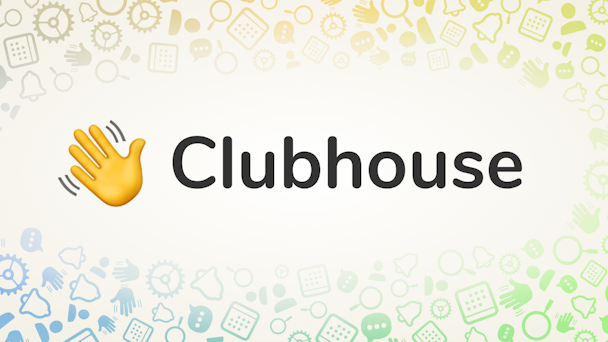Clubhouse strikes back as the ‘audio room’ space gets awfully crowded
Clubhouse went from the next big thing to ‘dead’ in a little over a year. But it hasn’t even launched yet, and its team vows there’s more to come. As part of our Mobile Deep Dive, The Drum asked Clubhouse’s new head of global marketing, Maya Watson, its chief competitor Facebook and other experts to tell marketers what they need to know.

Making room for marketers and creators.
Judging by the amount of buzz around Clubhouse, it feels like the audio chat social network has been around forever – or at least more than 14 months. But the reality is the app hasn’t officially launched yet. The ‘general release’ date has yet to be announced, but Clubhouse has said it will not be before the July 4 weekend.
In the meantime, Facebook officially launched its live audio rooms this week. Spotify launched its Greenroom feature last week. Twitter opened up its Spaces option last month. And there’s word that LinkedIn, Slack and Reddit are all quickly building their own Clubhouse-type offerings.
The audio room space got crowded, fast. With good reason: Clubhouse struck a chord during lockdown by enabling creators to host dozens or thousands of attendees in a room dedicated to whatever topic they like. “Clubhouse found itself in the middle of culture,” says Clubhouse global head of marketing Maya Watson. Whether it’s chats about the show Big Brother in Brazil, karaoke rooms in India or “people making cat noises at midnight, there’s a room for you,” she says.
But as parts of the world began to open up, people began to openly wonder whether drop-in audio chats would still be as relevant. After a two-month swoon, Clubhouse proved the doubters wrong to the tune of more than 6 million new downloads during the first three weeks of June, per the company. This was thanks in large part to its debut on Android. It’s now approaching 30 million downloads overall globally.
It is clearly only the beginning for Clubhouse and this brand-new segment, which offers significant benefits to marketers. Specifically, people in audio rooms are very engaged – often for up to 60 minutes. Then there’s the stripped down, raw environment which allows brands to appear authentic and transparent. Lastly, this ambiguous moment gives marketers a chance to experiment and create brand loyalty before the space becomes overrun and overproduced – which by most accounts appears to be happening very quickly.
Rooms for Bumble’s IPO, Bloomberg and the sounds of sizzling bacon
Clubhouse now has 400,000 rooms created every day, per the company. Within those rooms, early adopter marketers are finding eager audiences. BMW hosted a chat with film score composer Hans Zimmer. He discussed how he created the sounds for BMW’s new electric vehicle. Time Magazine’s editor-in-chief drops in weekly to readers. Bloomberg and the LA Times are regulars as well. Bumble used the platform to talk about its initial public offering as well as field questions. And infamously, IHOP served up the live sounds of sizzling bacon to 8,000 people.
“It’s a great platform for brand awareness, building communities, creating an authentic tone for the brand. It’s a channel for social listening and at the same time can be interesting for ideas and lead generation,” says Hinoti Joshi, business director, Global Lux at Wunderman Thompson.
Wunderman Thomson recently launched The Lux Clubhouse. It convened a diverse, talented group of female directors to share their thoughts, ideas and perspectives about bringing more female voices into the industry. “The forum helped us share thought leadership in an authentic way and drive our purpose by walking the talk and also going beyond the brand to bring about meaningful conversations that can change future narratives,” says Joshi. “It needs to be ongoing and something the brand will continue to own.”
Creating meaningful content and putting in the time to build an audience is key, says Watson. “It requires investment. It’s not just one time or a stunt, you really want to build that long-term connection.”
It also requires being active in other rooms. Watson notes that Bumble uses a “cross-pollinator strategy” where they have dedicated people dropping into different rooms to reinforce themselves as a leader in the dating space. Overall, Watson says, “the brands that are coming in now, learning and experimenting – they are going to win in the long-term because there’s definitely a first mover advantage.”
Here comes Facebook and all the rest
One of the original social networks, Facebook, announced this week that select US Facebook Groups and public figures can now create live audio rooms. It will be expanding availability and features in the coming months.
“It’s a really exciting space. We’re seeing more and more different ways that people want to come together,” says Nicola Mendelsohn, vice-president EMEA, Facebook. “It’s very early days, but it’s one that we think will further give our creators, in particular, different ways that they can connect with their audiences, and to express themselves.”
Like most trailblazers, Clubhouse is saying all the right things about welcoming the competition. “We’re not the type of people who feel intimidated or anything like that,” says Watson. “We’re still growing in the face of the Spaces rollout and Spotify is real loud. But our room sizes are growing, and our user base is growing so I think that’s a good indication. We’re keeping our heads down and making the best product we can.”
Then there’s the fact that people always hold a special place in their hearts for their first. “It’s important to note that the bonds between users on a social network is the key driver to a platform’s success,” says Eric Dahan, chief executive at Open Influence. “This is called a network effect, and it’s pretty challenging to replicate or challenge once it’s set up.”
What this means is that Clubhouse’s first mover advantage can be a very meaningful when it comes to holding its own against much bigger competitors, Dahan says. “Especially if Clubhouse’s user base is unique to its platform and creators have built unique followings on the Clubhouse platform. That means that for those creators, the switching costs are fairly high, since they risk losing the audience that they worked so hard to build.”
Watson says it could all come down to authenticity. “Coming out of 2020, and into 2021, platforms like ours where you can just be yourself are really interesting to people. It’s a bit counter cultural compared to what’s happened in the past where things were overly produced or over-choreographed. Clubhouse is a place where you can come as you are. No matter who you are, where you’re from or what you care about, there’s a room for you.”
For more in-depth coverage on the present and future of mobile marketing, dial in to The Drum’s Mobile hub. And don’t forget to sign up for The Drum’s daily US newsletter here.

